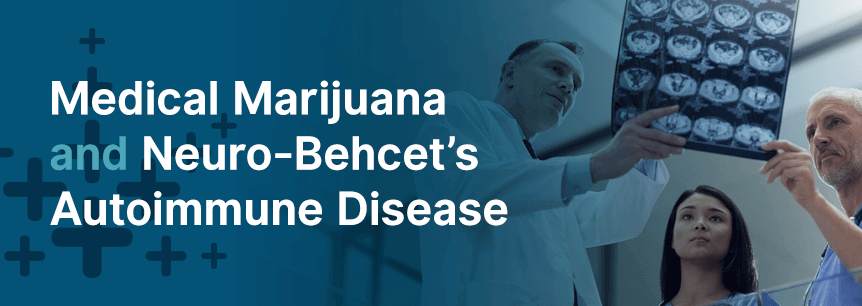
Neuro-Behcet’s autoimmune disease is a chronic, rare condition that affects people in their 20s and 30s. Marijuana and neuro-Behcet’s autoimmune disease treatment has anti-inflammatory properties and can help with pain symptoms too. Learn more about this disease and how cannabis can help alleviate your symptoms.
Neuro-Behcet’s disease, or NBD, is a subset of Behcet’s autoimmune disease with neurological involvement. Behcet’s disease, which is how some patients and professionals shorten neuro-Behcet’s, is a rare disease resulting in blood vessel inflammation throughout the body. Because symptoms do not always appear at the same time, diagnosing neuro-Behcet’s autoimmune disease can be challenging upon initial assessments.
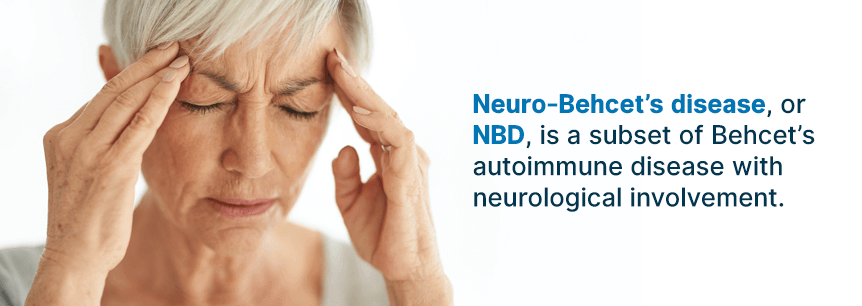
According to one study appearing in the Journal of Neurology, Neurosurgery, and Psychiatry, a central nervous system involvement with Behcet’s disease affects roughly 15 to 25 percent of all Behcet’s autoimmune disease cases.
Because neurological symptoms manifesting in NBD patients may be related to other neurological conditions, physicians must rule out certain other conditions when treating NBD, including:
One of the main factors setting Behcet’s syndrome and NBD apart is the involvement of brainstem is common while vascular complications are rare.
There are two primary types of neuro-Behcet’s autoimmune disease:
1. Parenchymal neuro-Behcet’s disease is the more common of the two and may or may not present with meningeal inflammation. Roughly 30 to 50 percent of parenchymal NBD cases result in relapses.
2. Non-parenchymal neuro-Behcet’s disease is the rarer of the two types of NBD, and typically manifests with cerebral venous thrombosis and aseptic meningitis. The prognosis for patients with non-parenchymal NBD is generally good, and recurrences are rare.
The precise cause of Behcet’s disease, of which neuro-Behcet’s disease is an offshoot, is unknown. There are many theories about the disease, including that it is hereditary, environmental, viral, bacterial or some combination of all these, with some people having genes making them more susceptible to the disease.
Some risk factors may increase the risk of developing Behcet’s syndrome.
Before identifying the symptoms of NBD, it is essential to understand the symptoms or signs of Behcet’s disease, at least some of which must be present before exploring the possibility of NBD.
One of the most frequent complications is blindness associated with the eye symptoms Behcet’s causes. People with Behcet’s syndrome should see eye doctors regularly as a preventive measure to avoid this complication.
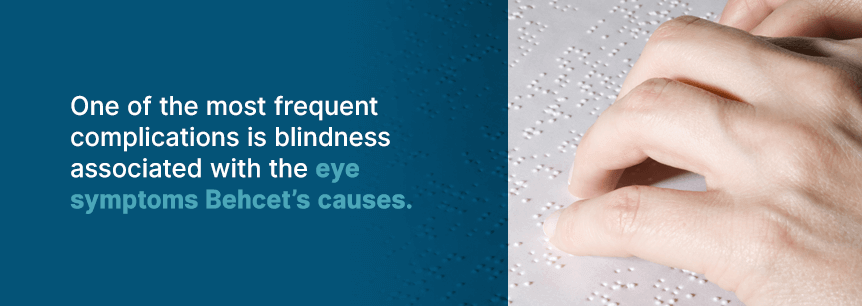
According to the European Medical Journal, there are no controlled trials for managing neuro-Behcet’s disease. Treatment options for the condition include high-dose pulses of methylprednisolone administered intravenously for five to 10 days, followed by oral prednisolone for up to four weeks, then oral tapering doses of glucocorticoids for two to three months to prevent relapse.
These medications do pose some risks of unpleasant side effects, including:
Because the risk of relapse is so high for patients with parenchymal NBD, immunosuppressive treatment is a best practice after relapse occurs to help prevent the occurrences or severity of relapses.
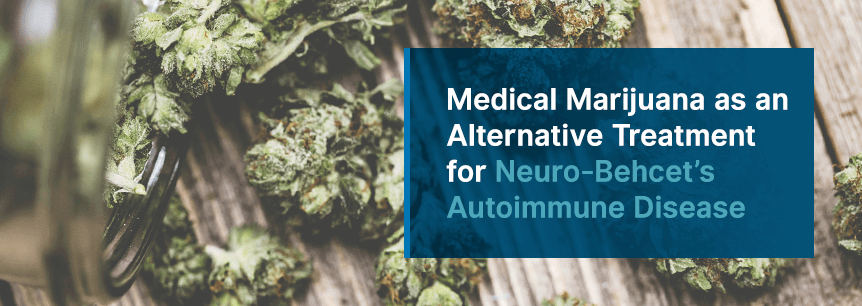
Before we get into how medical cannabis helps with neuro-Behcet’s syndrome, let’s first see how it affects your body.
Medical weed’s extraordinary healing properties are due to its high cannabidiol (CBD) content and its medicinal flavonoids and terpenes. Tetrahydrocannabinol (THC) is the cannabinoid known well for its psychoactive effects.
The human body has an endocannabinoid system (ECS). The journal Science first described this ancient biological system in 1992. The ECS releases human cannabinoids. These interact with your cannabinoid receptors, which are throughout almost all your tissues and cell membranes.
Biologically, ECS has an essential job in your body. It’s a group of cell receptors and molecules. There are two primary cell receptors — CB1 and CB2. Each responds differently to different cannabinoids.
Agonists bind to your cells, relaying messages and giving the cells directions. The ECS also plays a role in the physical and psychological effects of cannabis.
You also have cannabinoid receptors in your lungs, brain, kidneys, liver and immune system. Both medical cannabis’ psychoactive and therapeutic properties take place when cannabinoids activate a cannabinoid receptor.
While ongoing research is still lacking on how cannabinoid receptors impact your health, as of today, we know they play a vital role in many of your body’s processes, including the following.
Overall, cannabinoids balance out your biological systems and tissues.
Medical marijuana for neuro-Behcet’s autoimmune disease can help treat symptoms such as:
Research surrounding marijuana for neuro-Behcet’s autoimmune disease is somewhat lacking, but the evidence shows the cannabinoids in the herb can reduce inflammation and its related pain. Research shows THC has been therapeutic for chronic inflammatory conditions such as atherosclerosis. It has also decreased flu-related airway inflammation.
CBD decreases joint swelling and slows down the progression of autoimmune diseases like arthritis. Marijuana might also help tackle various cancers triggered by chronic inflammation.
Medical weed activates the CB1 and CB2 receptors, triggering an immunosuppressive response that prevents your body from attacking healthy cells. Also, as CBD and THC activate cannabinoid receptors, they mediate the pain linked with inflammation. By decreasing the inflammation, the cannabinoids help prevent pain from the start, too.
Inflammation isn’t supposed to be harmful to your health. In fact, your immune system helps protect you from things like viruses, infection and bacteria through the use of inflammation. When these foreign substances threaten your health, your immune system goes to work by sending out white blood cells to surround the affected area, protecting it and returning everything to its original state. This beneficial response is acute inflammation.
But, in some cases, the immune system mistakenly triggers this response in the wrong way. Either there isn’t a foreign substance to attack and it goes after healthy tissue, or the inflammation lasts too long. The immune system perceives this normal tissue as being a threat and fights, it which causes damage and other adverse effects.
Autoimmune diseases like neuro-Behcet’s can lead to chronic inflammation. Fortunately, medical marijuana and neuro-Behcet’s autoimmune disease treatment can help tackle this inflammation. Some strains to try are:
Medical marijuana is popular for its pain-relieving properties. So, you may experience good results with cannabis for abdominal pain. A Harvard review published in the Journal of the American Medical Association of 28 different trials of cannabinoids for treating pain shows quality evidence that supports using cannabis for chronic pain.
Medical pot can relieve the pain chronic inflammatory diseases cause. Cannabinoids act on your CB1 and CB2 receptors, and these are involved in the relief of pain linked with inflammation.
Doctors often prescribe opioid narcotics like Vicodin and Percocet to treat severe pain. However, opiates and narcotics are very addictive and can come with other adverse side effects, even though they do relieve pain.
Many individuals use analgesics like ibuprofen and acetaminophen. While these drugs aren’t addictive, they don’t reduce or eliminate pain effectively, and long-term use could cause stomach bleeding, liver damage and kidney damage.
Medical marijuana for abdominal pain is a safer and more effective treatment than opioids. Alleviate your abdominal pain with these cannabis strains:
Medical pot works with your body naturally to benefit your health. It interacts with your cells, telling your systems to function in specific ways, including your immune system. Medical cannabis’ impact on your immune responses is the reason behind many of its symptom-relieving properties.
Marijuana might also assist in the treatment of Neuro-Behcet’s by suppressing your immune system, thereby keeping it from attacking your healthy cells. That is because neuro-Behcet’s syndrome causes your immune system to become overly active and attack your healthy cells by mistake.
Your CB1 and CB2 cannabinoid receptors play a role. Your CB1 receptor is expressed in the brain predominantly, and your CB2 receptor is mainly on your immune system cells. Since both CB1 and CB2 receptors appear on immune cells, this suggests cannabinoids contribute to immune system regulation.
When suffering from an autoimmune disease such as neuro-Behcet’s, you’ll want to choose strains that help with things like inflammation and swelling, pain, depression and anxiety and fatigue.
Medical cannabis can be helpful for all these things and more.
Strains to try are:
Medical cannabis is a beneficial plant that can positively affect your mental health.
Although anxiety medicines like Ativan and Xanax have helped many people live a better quality of life, they’re not entirely effective for all people. If your current medicine isn’t helping you find relief from your symptoms, medical cannabis might be able to safely, quickly and gently decrease your anxiety. You can try these strains to relieve your anxiety:
For hundreds of years, individuals have been using marijuana to treat depression. There’s a lot of evidence on its ability to heighten a user’s mood and provide energy. Individuals with autoimmune diseases often suffer from depression. Using medical marijuana helps them cope with their depression symptoms.
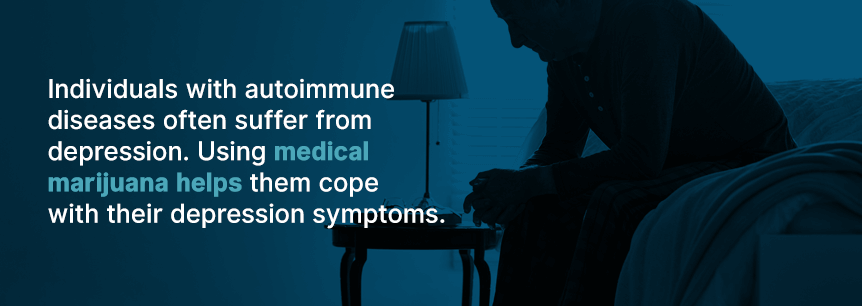
Research conducted by the University of Southern California on depression and marijuana using a survey that targeted both cannabis users and non-cannabis users showed exciting results. Among the 4,400 individuals surveyed, those who used cannabis showed fewer depression symptoms than those who didn’t.
Relieve your depression symptoms with these strains:
Medical marijuana for neuro-Behcet’s autoimmune disease affects each person differently. Side effects such as thirst or dry mouth, hunger, drowsiness, red eyes or short-term memory loss are common.
Choosing the right delivery method for your marijuana and neuro-Behcet’s autoimmune disease will depend on your symptoms and your reaction to using marijuana. There are many different methods to choose from, and each will affect you differently, so working with your budtender and medical marijuana doctor can help you decide the best way to take cannabis for you.
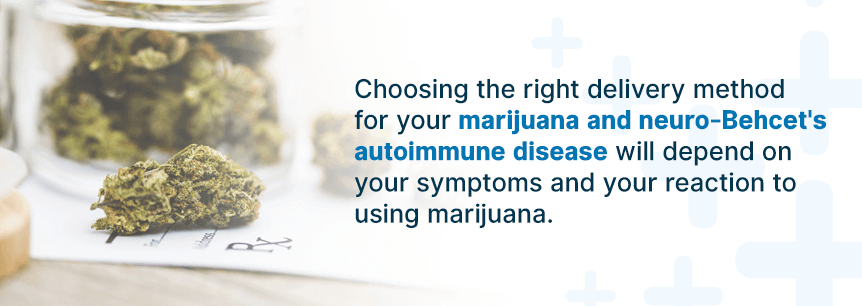
1. Smoking: Though smoking is the most popular method of cannabis use, it could potentially harm your health. Similar to cigarettes, weed also produces toxins and tar when you inhale the smoke.
2. Vaping: Vaping isn’t as harmful to your lungs as smoking. You inhale steam through a vaporizer.
3. Edibles: People can infuse food and beverages with cannabis. Some good examples are cookies, candy, brownies, and smoothies.
4. Pure CBD: Currently gaining in popularity, pure CBD is available in pills and oils.
5. Patches: You wear transdermal patches on your skin. You can buy them in 100 percent CBD formula to avoid the THC-related paranoia.
6. Topicals: These can come in balms, salves, creams, and lotions and help patients deal with pain.
An essential part of starting your marijuana and neuro-Behcet’s autoimmune disease treatment is finding and consulting with a qualified marijuana doctor and choosing a reputable medical cannabis dispensary. Fortunately, you can find both at Marijuana Doctors.
Browse our extensive list of cannabis doctors and dispensaries across the entire country so you can find one local to you. You’ll find hours, locations, reviews, delivery information and more. Our cannabis doctors comply with all state laws and will work with you to tailor a customized cannabis treatment plan. Book your appointment today.
Find A Doctor Find A Dispensary